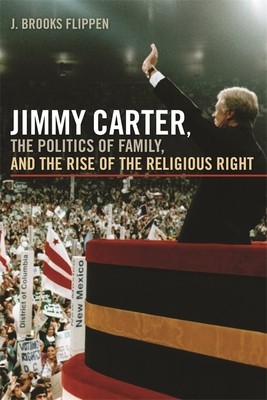
- We will send in 10–14 business days.
- Author: J Brooks Flippen
- Publisher: University of Georgia Press
- ISBN-10: 0820337706
- ISBN-13: 9780820337708
- Format: 15.2 x 22.6 x 3.1 cm, softcover
- Language: English
- SAVE -10% with code: EXTRA
Jimmy Carter, the Politics of Family, and the Rise of the Religious Right (e-book) (used book) | bookbook.eu
Reviews
Description
As Jimmy Carter ascended to the presidency the heir apparent to Democratic liberalism, he touted his background as a born-again evangelical. Once in office, his faith indeed helped form policy on a number of controversial moral issues. By acknowledging certain behaviors as sinful while insisting that they were private matters beyond government interference, J. Brooks Flippen argues, Carter unintentionally alienated both social liberals and conservative Christians, thus ensuring that the debate over these moral "family issues" acquired a new prominence in public and political life.
The Carter era, according to Flippen, stood at a fault line in American culture, religion, and politics. In the wake of the 1960s, some Americans worried that the traditional family faced a grave crisis. This newly politicized constituency viewed secular humanism in education, the recognition of reproductive rights established by Roe v. Wade, feminism, and the struggle for homosexual rights as evidence of cultural decay and as a challenge to religious orthodoxy. Social liberals viewed Carter's faith with skepticism and took issue with his seeming unwillingness to build on recent progressive victories. Ultimately, Flippen argues, conservative Christians emerged as the Religious Right and were adopted into the Republican fold. Examining Carter's struggle to placate competing interests against the backdrop of difficult foreign and domestic issues--a struggling economy, the stalled Strategic Arms Limitation Talks, disputes in the Middle East, handover of the Panama Canal, and the Iranian hostage crisis--Flippen shows how a political dynamic was formed that continues to this day.EXTRA 10 % discount with code: EXTRA
The promotion ends in 17d.02:31:57
The discount code is valid when purchasing from 10 €. Discounts do not stack.
- Author: J Brooks Flippen
- Publisher: University of Georgia Press
- ISBN-10: 0820337706
- ISBN-13: 9780820337708
- Format: 15.2 x 22.6 x 3.1 cm, softcover
- Language: English English
As Jimmy Carter ascended to the presidency the heir apparent to Democratic liberalism, he touted his background as a born-again evangelical. Once in office, his faith indeed helped form policy on a number of controversial moral issues. By acknowledging certain behaviors as sinful while insisting that they were private matters beyond government interference, J. Brooks Flippen argues, Carter unintentionally alienated both social liberals and conservative Christians, thus ensuring that the debate over these moral "family issues" acquired a new prominence in public and political life.
The Carter era, according to Flippen, stood at a fault line in American culture, religion, and politics. In the wake of the 1960s, some Americans worried that the traditional family faced a grave crisis. This newly politicized constituency viewed secular humanism in education, the recognition of reproductive rights established by Roe v. Wade, feminism, and the struggle for homosexual rights as evidence of cultural decay and as a challenge to religious orthodoxy. Social liberals viewed Carter's faith with skepticism and took issue with his seeming unwillingness to build on recent progressive victories. Ultimately, Flippen argues, conservative Christians emerged as the Religious Right and were adopted into the Republican fold. Examining Carter's struggle to placate competing interests against the backdrop of difficult foreign and domestic issues--a struggling economy, the stalled Strategic Arms Limitation Talks, disputes in the Middle East, handover of the Panama Canal, and the Iranian hostage crisis--Flippen shows how a political dynamic was formed that continues to this day.

Reviews